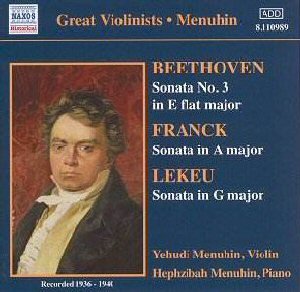An exceptionally interesting trio of sonatas, and a combination
that works well as a one-disc recital. The Beethoven dates from
Menuhin's second Australian visit, and something of the joy of
this time for the violinist is transmuted into Beethovenian joy.
There is a real warmth from both pianist and violinist from the
outset, both opting for a light tone. Yehudi is not always 100% in
tune - as so often - and sometimes the ear seems drawn to
Hephzibah's always musical playing. The unsubtle punch in the
stomach at 6'24 in the second movement is uncharacteristic in a
movement where delicacy is the watchword. The finale is the best
movement, with both players enjoying the rhythmic pointing. It also
catches Menuhin more in the middle of notes.
The Franck, to be honest, lacks the sense of breadth this work so
desperately needs. While the second movement is undeniably
exciting, the third is ponderous on Hephzibah's side. The
finale is forced - taken down in Paris, maybe the Menuhins were
missing the Aussie sunshine that may have induced a more laid-back
approach to this masterpiece.
For some, the Lekeu will be the drawing point of this disc. Franck
was actually Lekeu's teacher, so the Franckian influence on the
finale's opening should hardly come as a surprise. The Menuhins
seem closer to Lekeu, though, as right from the start, there is a
hypnotic element to the playing - of both parties - that was simply
not there in the Beethoven or the Franck. The dreamy, easy flow of
the first movement and its cri de coeur (around 6'05) is
intensely involving. The 'très lent' second
movement is hyper-delicate.
Whatever my reservations about the Beethoven and - especially - the
Franck, the Lekeu makes this disc a worthwhile purchase. This
particular performance was available on Biddulph, but alas I do not
have a reference copy for comparison. Ward Marston's transfers
are excellent, as are Tully Potter's booklet notes.
Colin Clarke


